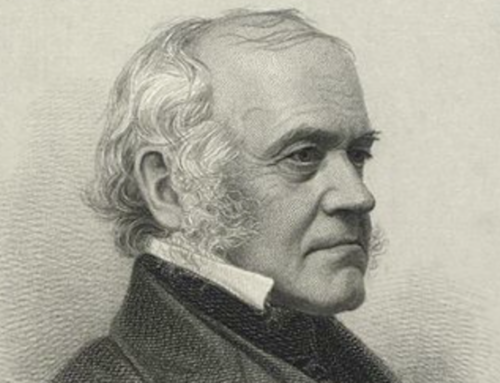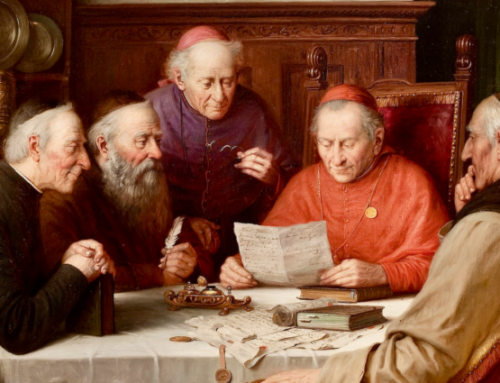Many believe that objectivity is the historian’s goal. But Forrest McDonald believed that history by its very nature entails artifice; the historian is not simply a mere recorder or reporter of events, but also an artist.
“History is marble, and remains forever cold, even under the most artistic hand, unless life is breathed into it by the imagination. Then the marble becomes flesh and blood—then it feels, it thinks, it moves, and is immortal.” —Charles Gayarré (1805-1895)
 It is often the case that geniuses defy simple categorization as adherents of a particular school of thought or as exemplars of a particular genre. One thinks, for instance, of Ludwig van Beethoven, who is said with some truth to bridge the classical and romantic periods of music. Though such modes of thinking can be helpful in making sense of the creator’s creations, the best approach to understanding an artist or writer is to consider him on his own terms. Of course, understanding someone in context is important, but in focusing too much on context and intellectual genealogy, individuals can be reduced to mere byproducts of others’ influences instead of being seen as creative actors in their own right.
It is often the case that geniuses defy simple categorization as adherents of a particular school of thought or as exemplars of a particular genre. One thinks, for instance, of Ludwig van Beethoven, who is said with some truth to bridge the classical and romantic periods of music. Though such modes of thinking can be helpful in making sense of the creator’s creations, the best approach to understanding an artist or writer is to consider him on his own terms. Of course, understanding someone in context is important, but in focusing too much on context and intellectual genealogy, individuals can be reduced to mere byproducts of others’ influences instead of being seen as creative actors in their own right.
Forrest McDonald, the great historian of the American Founding, must also be appreciated in this way, for he is sui generis. Though he undoubtedly has influences—foremost among these being his mentor, Fulmer Mood—McDonald belongs to no school of thought in terms of his historical writing. This independence of mind and interpretation was a happy byproduct of his experience in graduate school at the University of Texas in the 1950s, where few professors discussed the philosophy of history with their students. “As a consequence,” McDonald recalls in his memoir, Recovering the Past, “I emerged from graduate school entirely ignorant of what had been happening in the profession over the course of the preceding three or four decades.”
In an era when historians are obsessed about how their interpretation fits into the “literature,” i.e., the corpus of works by other historians on the same or related topics, McDonald has had little interest in the broad interpretative arguments of other historians. When beginning a book, he asks his wife Ellen to read the best handful of extant works on the topic and to give him a brief summary of their main points. One senses that McDonald does this more to spark his own thinking than to worry about how what he is about to say “fits” into the literature, as the latter concern could lead to tainting his independent evaluation of the evidence.
Context, then, can cloud as much as clarify a historian’s thinking. This, McDonald believes, is true in terms of maintaining interpretive independence of mind in regard to other historians and in terms of examining the past itself—that is, “doing history.” In his memoirs, McDonald uses the 1966 film Blowup as an example of the problem of context. In the movie, a photographer spends a typical day snapping pictures of a model, and when developing them later in his lab, notices in the background of one of the shots a murder taking place. “The murder is the story, the possible subject of a history,” McDonald suggests, “but it becomes such only when removed from the context of the day’s events.” The female model’s seductive poses are the center of the picture and are quite alluring, and though she appears in the same scene as the difficult-to-see murder, she is simply a distraction to that scene. Similarly, context can actually impede understanding when doing history.
McDonald would likely agree with Emerson’s notion that “there is properly no history, only biography.” “Biographies are more instructive for the general reader than is conventional history,” McDonald writes, “for almost every biographer tries to tell the reader what made the subject tick.” The good historian, however, does this same thing. He must explain why events happened, and their significance. He does this, like the photographer in Blowup, by pulling something he sees out of the bigger picture. “History is a mode of thinking that wrenches the past out of context and sequence,” McDonald posits, “out of the way it really happened, and reorders it in an artificial way that facilitates understanding and remembering.”
McDonald’s groundbreaking work on the economic origins of the Constitution, We the People, which overturned the widely-accepted economic-determinist theory of the Founding put forth by Charles A. Beard, is a series of economic biographies of the delegates to the Constitutional Convention. History is, at bottom, story, McDonald believes, the story of many, which can only be understood by studying as many biographies and smaller stories as possible and then fashioning a larger narrative out of these elements. Of course, this kind of “doing history” involves hard work—perspiration as the foundation of inspiration.
McDonald has always been willing to do this kind of hard historical work; in his memoirs he recounts the long summer he spent as a young academic, sleeping in his car and on couches in various archives as he traveled up and down the east coast, compiling research for We the People. In Novus Ordo Seclorum: The Intellectual Origins of the Constitution, perhaps his magnum opus, McDonald writes in a footnote that his conclusions are based partly on “having read virtually every line of virtually every extant American newspaper for the period [1765-1790] and a large body of personal correspondence.” McDonald recalls that he “had a couple of special gifts going for me: boundless self-confidence and inexhaustible energy.”
Primary research, however, is simply the foundation for the historian, the beginning, not the end of his craft. McDonald argues that the three phases of the historian’s process are: “finding and taking in information, digesting and reducing it to meaningful generalizations, and writing it up.” McDonald confesses that he made the mistake in We the People of explaining to the reader his thought processes in the second phase. In essence, he committed the chef’s error of describing to the diner how the sausage on his plate was made. The result was unpalatable history, as McDonald admits in the preface to that work’s sequel, E Pluribus Unum: The Formation of the American Republic, 1776-1790: We the People, McDonald says, is “a prime example” of dry writing.
Resolved to make his E Pluribus Unum more readable, McDonald made sure that this time phases two and three of his craft involved what he refers to as “intuition” or “imagination.” Some may protest that imagination has no place in the historian’s work, that objectivity is the historian’s goal. McDonald, however, believes that history by its very nature entails artifice; the historian is not simply a mere recorder or reporter of events, but also, like the author of literature or the filmmaker, an artist.
In his preface to E Pluribus Unum, McDonald dismisses the idea of objective history, holding that the business of writing history is at the same time both subjective and true:
So believing, I have written a book which is unabashedly ‘subjective.’ It is myself: through the course of more than 20,000 hours of conscious work and several times that in unconscious work, I have taken in a hundred thousand or so scraps of information, and attempt here not to reproduce them but to tell you what they mean. Yet I believe that what I tell you is not only objectively true but also objectively verifiable.
As in his academic work, so in contemporary intellectual and political debates has it been difficult to pigeonhole McDonald. Readily accepting the label “conservative” and even “paleo-conservative,” he yet refuses to ally himself with any particular conservative intellectual school. As the conservative intellectual movement split into two camps in the 1970s and 1980s—the disciples and opponents of German-born political philosopher Leo Strauss—McDonald displayed little interest in discussing the thought of Strauss or in defining himself in relation to Strauss’ ideas. Though McDonald would indeed come to oppose many Straussian notions, he has no animus against Strauss per se, and evidence of agreement with Strauss has never been enough to indict a scholar in McDonald’s mind. Not for him the epithet of “Straussian” tossed out by so many fellow paleo-conservatives.
Above all else, in the business of history as in the realm of politics, McDonald detests ideologues. During his academic career, he has read manuscripts for fellow historians, including Marxists, whose intellect he respects. It does not matter how they vote, who their mentor is, or whether they belong to the same historical organizations as he. As he is the disciple of no scholar, McDonald similarly never sought to forge an interpretative school among his students. To say that a certain scholar is a student of Forrest McDonald does little to shed light on that person’s historical interpretations.
His political conservatism too follows no single strand of thought, no specific program. It boils down essentially to a visceral contempt for the bloated federal government. When I once asked him about his trip to Washington, D.C. to testify before the House Committee on Impeachment during the Clinton-Lewinsky scandal, he reported that he “hated it” because the trip compelled him to see the mammoth public buildings built at taxpayer expense—“the temples of our oppressors,” as he put it. When a congressional aide phoned the McDonalds about reimbursing their expenses for this same trip, Ellen angrily slammed down the phone saying, “We don’t take money from you people!”
I recently experienced an encounter with an eminent scholar of the paleo-conservative school who asked me why McDonald is a “neo-conservative” when it comes to modern foreign policy issues. This well-respected questioner referred specifically to McDonald’s alleged agreement with the idea that the United States should create a rapid-deployment force that could strike anywhere in the world on a moment’s notice. The best answer that I could give was that, though he detests the modern leviathan in Washington—whose creation he blames on Lyndon Baines Johnson—McDonald is a fan of a unified nation with a strong government capped by an energetic executive. In his monumental 1995 volume, The American Presidency, McDonald puts forth a claim that likely riles many paleo-conservatives: “The presidency has been responsible for less harm and more good, in the nation and the world, than perhaps any other secular institution in history.”
Indeed, it has always confounded conservatives of various stripes, especially localists, agrarians, and states’ righters, that McDonald’s primary hero in history is Alexander Hamilton, whose biography he penned in 1979. McDonald’s admiration for the man cannot be separated from his admiration for the man’s ideas; it is what men do as much as what they believe that counts. For McDonald, who, by his own assessment, has “spent most of my adult life in the 18th eighteenth century,” history is indeed biography. He judges men, past and present, on a case-by-case basis, and he respects four qualities in particular: intellectual prowess, steely determination, hard-headed realism, and physical courage.
McDonald finds these qualities in the person of Hamilton, who possessed a brilliant economic and legal mind, who raised himself from the poverty of his illegitimate birth in the West Indies, who sought practical solutions for the fledgling country’s problems, and who eagerly braved British bullets during the Revolutionary War. McDonald, in contradistinction to many of his academic allies and close friends, including Clyde Wilson and Mel Bradford, believes that the Federalist Party’s prescription for the United States was the correct one, at least until 1830 or so. If the Hamiltonian/Federalist program had not been followed, McDonald concludes that the United States would have splintered into “a collection of banana republics. “
Also unlike Wilson and Bradford, McDonald harbors no animus toward the polarizing figure of Abraham Lincoln, even though the consolidation of central government power that resulted from the Union’s victory in 1865 is the clear beginning point of the decline of federalism that McDonald chronicles in his States’ Rights and the Union: Imperium in Imperio, 1776-1876. “I’m the only American historian who doesn’t give a damn about the Civil War,” McDonald once said privately.
Now retired after more than a half-century of work, McDonald has left a great legacy for those who follow him. In addition to adding immeasurably to our understanding of American history, and particularly the Founding Era, he has set an example of how history is to be done, “on proper principles,” as he once put it. By maintaining independence of mind, by doing the hard work of primary research, by loving history for its own sake, and by infusing one’s imagination into his writing, the historian engages in true historical thinking. In so doing, he serves a conservative purpose, allowing us, as McDonald says, to “escape the provincialism of the present.”
This essay was first published here in October 2013.
The Imaginative Conservative applies the principle of appreciation to the discussion of culture and politics—we approach dialogue with magnanimity rather than with mere civility. Will you help us remain a refreshing oasis in the increasingly contentious arena of modern discourse? Please consider donating now.
The featured image is courtesy of Pixabay.







Leave A Comment